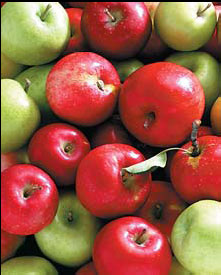IN BRIEF (Page 19)
Chest pain an ominous sign
In a long-term follow-up study, chest pain felt by men and women in their 40s was a major risk factor for premature death due to heart disease later on.
In the study, chest pain or "angina" was determined by answers to a shortened version of the widely used World Health Organization's Rose Angina Questionnaire, which asks three simple questions: Do you get pain or discomfort in your chest when walking up hills, stairs or hurrying on level ground? If you get pain or discomfort in the chest when walking, do you usually stop, slow down, or carry on at the same place? If you stop or slow down, does the pain disappear after less than 10 minutes, or after 10 minutes or more?
Saffron may ease PMS
Saffron, a spice known for flavoring Mediterranean cuisine, might also offer an antidote to premenstrual syndrome, a study suggests. Saffron, the world's most expensive spice, has a long history of non-culinary uses. Traditionally, the spice has been advocated for stomach pain, digestive problems and even depression - with some recent clinical trials suggesting that saffron may in fact aid mild depression.
Prozac might cure 'lazy eye'
Prozac, the popular antidepressant, might also be an effective treatment for adults with a "lazy eye," according to new research. A team of Italian and Finnish scientists said on Thursday that the medicine helped correct the eyesight of rats whose vision had been impaired in early development and it could well do the same for humans.
An apple a day - it's true

German scientists have found new proof of that old adage about an apple a day keeping the doctor away by showing the fruit helps reduce the incidence of colon cancer.
German researchers led by Dieter Schrenk found that apples and apple juice enhance biological mechanisms that produce anticarcinogenic compounds during the fermentation process.
Their research showed that apple pectin and apple juice extracts have anti-carcinogenic effects on the colon.
The researchers believed that the presence of apple pectin and apple juice extracts would increase the presence of the compound butyrate which is believed to be a chemopreventative metabolite that might prevent the occurrence of colorectal cancer.
Obese dad liver risk
Having a father who becomes obese at a relatively young age may increase a person's risk of developing serious liver problems, a new study shows. Individuals whose fathers were obese before age 45 were more likely than those whose parents were not obese to have high levels of alanine aminotransferase (ALT) in their blood, an enzyme that signals liver injury, Rohit Loomba of the National Institutes of Health in Bethesda, Maryland and colleagues found.
Cholesterol Alzheimer's link
High cholesterol levels in your 40s may raise the chance of developing Alzheimer's disease decades later, according to a study underscoring the importance of health factors in middle age on risk for the brain ailment. The study involving 9,752 people in northern California found that those with high cholesterol levels between ages 40 and 45 were about 50 percent more likely than those with low cholesterol levels to later develop Alzheimer's disease.
Factors for baby's survival
Four factors beyond gestational age influence whether an extremely premature baby will survive and grow up healthy, US researchers reported recently. Babies that weigh more and babies that do not have a twin all survived premature birth better, as did babies whose mothers were treated with steroids to hasten the development of the lungs, the researchers reported in the New England Journal of Medicine.
Agencies
(China Daily 04/23/2008 page19)














